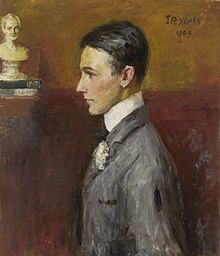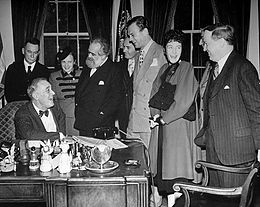fiction.wikisort.org - Writer
Van Wyck Brooks (February 16, 1886 in Plainfield, New Jersey – May 2, 1963 in Bridgewater, Connecticut) was an American literary critic, biographer, and historian.

Biography

Brooks graduated from Harvard University in 1908. As a student he published his first book, a collection of poetry called Verses by Two Undergraduates, co-written with his friend John Hall Wheelock.[1]
Brooks's best-known work is a series of studies entitled Makers and Finders (5 volumes, 1936–1952), which chronicled the development of American literature during the long 19th century. Brooks embroidered elaborate biographical detail into anecdotal prose. For The Flowering of New England, 1815–1865 (1936) he won the second National Book Award for Non-Fiction from the American Book Sellers Association[2][3] and the 1937 Pulitzer Prize for History. The book was also included in Life Magazine's list of the 100 outstanding books of 1924–1944.[4]
Brooks was a long-time resident of Bridgewater, Connecticut, which built a town library wing in his name. Although a decade-long fund-raising effort was abandoned in 1972, a hermit in Los Angeles, Charles E. Piggott, with no connection to Bridgewater surprised the town by leaving money for the library in his will. With $210,000 raised, the library addition went up in 1980.[5]
Among his works, the book The Ordeal of Mark Twain (1920) analyzes the literary progression of Samuel L. Clemens and attributes shortcomings to Clemens's mother and wife. In 1925 he published a translation from French of the 1920 biography of Henry David Thoreau by Leon Bazalgette, entitled Henry Thoreau, Bachelor of Nature.
In 1944, Brooks was on the cover of Time Magazine.[6]
Bibliography
- 1905: Verses by Two Undergraduates (with John Hall Wheelock)
- 1908: The Wine of the Puritans: A Study of Present-Day America
- 1913: The Malady of the Ideal: Senancour, Maurice de Guérin, and Amiel
- 1914: John Addington Symonds: A Biographical Study
- 1915: The World of H.G. Wells
- 1915: America's Coming of Age
- 1920: The Ordeal of Mark Twain
- 1925: The Pilgrimage of Henry James
- 1925: Henry Thoreau, Bachelor of Nature (by Leon Bazalgette, translated by Van Wyck Brooks)
- 1932: The Life of Emerson
- 1934: Three Essays on America
- 1936: The Flowering of New England, 1815-1865 (Makers and Finders)[7]
- 1940: New England: Indian Summer, 1865-1915 (Makers and Finders)
- 1941: Opinions of Oliver Allston
- 1941: On Literature Today
- 1944: The World of Washington Irving (Makers and Finders)
- 1947: The Times of Melville and Whitman (Makers and Finders)
- 1948: A Chilmark Miscellany
- 1952: The Confident Years: 1885-1915 (Makers and Finders)
- 1952: Makers and Finders: A History of the Writer in America, 1800-1915
- 1953: The Writer in America
- 1954: Scenes and Portraits: Memoirs of Childhood and Youth (An Autobiography)
- 1955: John Sloan: A Painter's Life
- 1956: Helen Keller: Sketch for a Portrait
- 1957: Days of the Phoenix: The Nineteen-Twenties I Remember (An Autobiography)
- 1958: The Dream of Arcadia: American Writers and Artists in Italy, 1760-1915
- 1958: From a Writer's Notebook
- 1959: Howells: His Life and World
- 1961: From the Shadow of the Mountain: My Post-Meridian Years (An Autobiography)
- 1962: Fenollosa and His Circle: With Other Essays in Biography
- 1965: An Autobiography
Awards and honors
Places named after him
The Van Wyck Brooks Historic District, known for its old Victorian and Second French Empire style buildings in Plainfield, the town of his birth, is named after him.
Prizes
- 1937: Pulitzer Prize in history and National Book Award for 1936 nonfiction[3]
- 1938: Goldmedaille des Limited Editions Club
- 1944: Carey Thomas Award for The World of Washington Irving
- 1946: Goldmedal of National Institute of Arts and Letters (American Academy of Arts and Letters)
- 1953: Theodore Roosevelt Distinguished Service Medal
- 1954: Huntington Hartford Foundation Award
- 1957: Secondary Education Board Award for Helen Keller: Sketch for a Portrait
Honorary degrees
Doctor of Letters:
- Boston University
- Bowdoin College
- Columbia University
- Dartmouth College
- Fairleigh Dickinson University
- Harvard University
- Northeastern Illinois University
- Tufts University
- Union College
- University of Pennsylvania
Doctor of Humane Letters:
- Northwestern University
References
- Sullivan, Roderick B. (February 2001). "Biography of John Hall Wheelock, Poet", Biographies of Notable Wheelocks. Retrieved 3 July 2012.
- "Books and Authors", The New York Times, 1936-04-12, p. BR12. ProQuest Historical Newspapers The New York Times (1851–2007).
- "5 Honors Awarded on the Year's Books: ...", The New York Times, 1937-02-26, p. 23. ProQuest Historical Newspapers The New York Times (1851–2007).
- Canby, Henry Seidel. "The 100 Outstanding Books of 1924–1944". Life Magazine, 14 August 1944. Chosen in collaboration with the magazine's editors.
- Burnham Public Library Web site, Library History Web page, accessed May 4, 2009
- Time.com
- archive.org
Further reading
- Blake, Casey Nelson (1990). Beloved Community: The Cultural Criticism of Randolph Bourne, Van Wyck Brooks, Waldo Frank & Lewis Mumford. Chapel Hill: University of North Carolina Press. ISBN 0-8078-1935-2.
External links
- Van Wyck Brooks papers, 1872-1983, Kislak Center for Special Collections, Rare Books and Manuscripts, University of Pennsylvania
- Works by Van Wyck Brooks at Project Gutenberg
- Works by or about Van Wyck Brooks at Internet Archive
- Works by Van Wyck Brooks at LibriVox (public domain audiobooks)

- Van Wyck Brooks at Find a Grave
- Finding aid to Van Wyck Brooks papers at Columbia University. Rare Book & Manuscript Library.
На других языках
[de] Van Wyck Brooks
Van Wyck Brooks (* 16. Februar 1886 in Plainfield, New Jersey; † 2. Mai 1963 in Bridgewater, Connecticut) war ein amerikanischer Literaturkritiker und -historiker, der 1937 für sein Werk The Flowering of New England den Pulitzer-Preis für Geschichte verliehen bekam.- [en] Van Wyck Brooks
Другой контент может иметь иную лицензию. Перед использованием материалов сайта WikiSort.org внимательно изучите правила лицензирования конкретных элементов наполнения сайта.
WikiSort.org - проект по пересортировке и дополнению контента Википедии